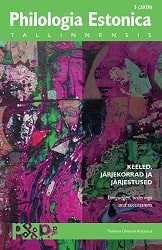Eesnimekasutuse reguleerimine ja selle mõju. Eesti ja Ungari näide
Given Name Regulation and its Influence – The Examples of Estonia and Hungary
Author(s): Annika Hussar, Tiina RüütmaaSubject(s): Cultural history, Comparative Linguistics, Sociolinguistics, Finno-Ugrian studies, 18th Century, 19th Century
Published by: Tallinna Ülikooli Kirjastus
Keywords: onomastics; given names; personal names regulations; personal names act; native names; language modernisation; Estonian language; Hungarian language;
Summary/Abstract: Estonian and Hungarian given name usage can be said to be at opposing ends of the name regulation scale: the almost regulation-free Estonian versus the very regulated Hungarian. Speaking of what determines what is accepted and what is not accepted in given name usage, we have to take into consideration on the one hand official regulations and on the other the traditions that have developed over centuries. The historical background of the given name usage of Estonia and Hungary is somewhat similar: both countries have gone through a period of the language modernisation, a period of conscious language development as well as a period of formation of native name stock, all connected to the rise of the national selfconsciousness. In this context the Hungarian name stock renewal can be seen as an indirect example to Estonia. The paper discusses the development as well as the current situation of the given name regulations in both Estonia and Hungary in comparison to the regulations of some other European countries. We can see similarities between the Estonian, Finnish and Swedish laws, all of which have few restrictions. This is in contrast to the Hungarian name law, which has features in common with that of Latvia – both require that names be spelled in accordance with spelling conventions of the respective national language, and also with Icelandic regulations, whereby given names can only be chosen from an approved list and traditions date back many generations. Estonian and Hungarian name practices have been influenced by certain features, among which the most important has been the timing. The tradition of spelling names in accordance with Hungarian spelling convention dates back to the end of the C18th and beginning of the C19th, and has changed little since. This is in contrast to Estonia, where the current spelling system was introduced only as late as the second half of the 19th century. At this time the replacement of traditional loan names by new foreign names had begun, which was then followed by the recommendation to adopt native names. The quick change in the name stock within some 50 years made it impossible to determine a list of given names to choose from and people had already got used to both the free name creation and a huge variety of different names.
Journal: Philologia Estonica Tallinnensis
- Issue Year: 5/2020
- Issue No: 1
- Page Range: 87-108
- Page Count: 22
- Language: Estonian

